Examples - School Project
School Project has provided the opportunity for music education to a total of 2,963,000 children in 7 countries as of December 2023.
Vietnam
Since School Project initiatives began in Vietnam in 2016, Yamaha has continued working in collaboration with Yokohama National University and KYOIKU GEIJUTSU SHA CO. to conduct teacher training and revise textbooks with the aims of introducing and firmly establishing activities using musical instruments. In October 2017, Yamaha signed a memorandum of understanding with the Primary Education Department of the Ministry of Education and Training (MOET) of the Socialist Republic of Vietnam in regard to the broader promotion of instrumental music education. For two years leading up to 2019, Yamaha worked to form music clubs making use of recorders and pianicas in 275 primary schools in 10 cities nationwide in Vietnam, with government approval. Instruction in musical instruments had not previously been included in the course of study at primary and secondary schools, but was added in 2020 and is now included at every public primary and secondary school in Vietnam, using percussion instruments, recorders, and pianicas. In 2023, Yamaha conducted teacher seminars in collaboration with MOET at the beginning of fourth grade classes at primary schools.
In 2016, these activities were adopted as a EDU-Port Japan Certified Project by Japan’s Ministry of Education, Culture, Sports, Science and Technology (MEXT) under the designation of “Dissemination of Japanese-style Education Using the Public-Private Collaborative Platform.”In 2018, they were once again adopted as a Supported Project.



Malaysia
In Malaysia, national education policy aims not only to instill knowledge, but to nurture the ability to draw from learned knowledge to synthesize new knowledge, to cultivate the capacity to collaborate with people from diverse backgrounds, and to develop the ability to solve problems peacefully. Musical education was introduced into the primary school curriculum in 1985. It was merged into fine arts in 2017, but reintroduced as a standalone subject once again in 2020.
School Project was launched in Malaysia in 2015 and adopted as an extracurricular activity program under the Extracurricular Activities Division of the Ministry of Education (MOE) in 2017. Activities using keyboards have extended to 404 schools in 16 states nationwide. In 2023, Yamaha cooperated with the MOE to help introduce musical education using keyboards on a trial basis by launching trial classes at 11 schools. The classes use keyboards in activities meant to nurture creativity, with plans for official introduction into the revised national curriculum in 2027.
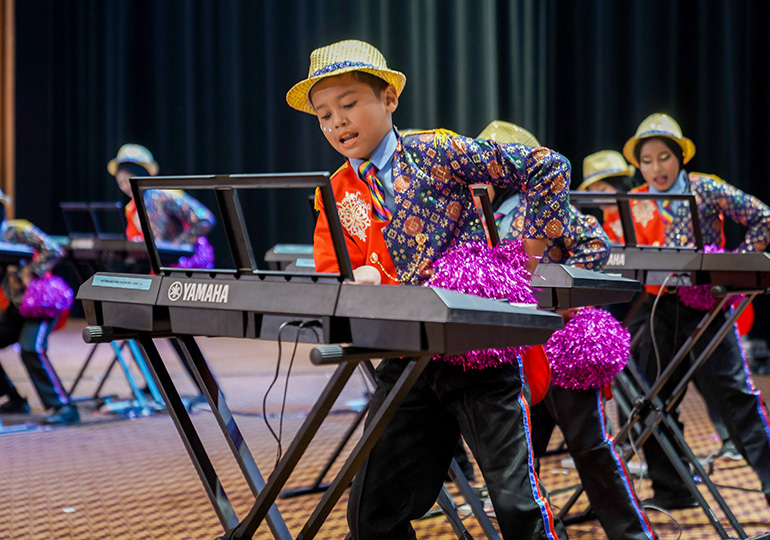
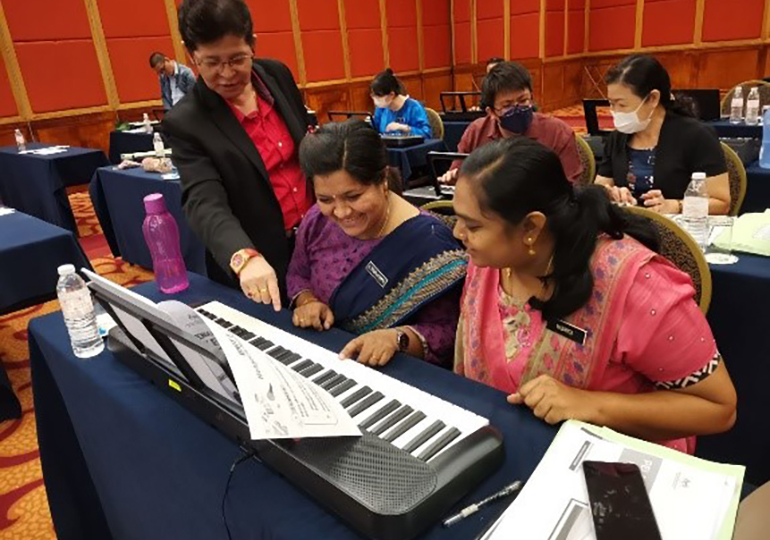
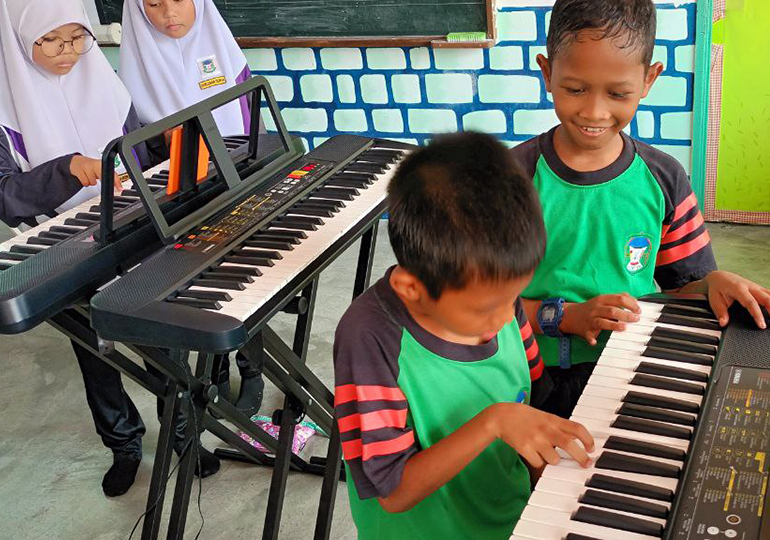
Indonesia
Indonesia’s 2013 national curriculum aims to nurture students who are good-hearted, well-mannered, creative, innovative, and quick thinkers, and in 2022, the Indonesian Ministry of Education, Culture, Research, and Technology (Kemdikbudristek) developed a new curriculum to help strengthen education and offset the effects of the COVID-19 pandemic.
In 2015, Yamaha launched the School Project in Indonesia. In 2017, Yamaha implemented recorder and pianica programs at all 514 schools throughout Indonesia after signing an agreement to cooperate with “Strengthening Character Education (Penguatan Pendidikan Karakter),” an initiative of the Kemdikbudristek. In accordance with the Curriculum Merdeka, developed in 2022, Yamaha conducted online webinars for primary school teachers in cooperation with Kemdikbudristek’s Directorate General of Teachers and Education Personnel. A total of 11,008 people participated from 7,584 elementary schools across the country. In 2023, Yamaha collaborated with Kemdikbudristek to conduct a nationwide pianica competition. Going forward, we will continue to develop and provide e-learning contents and educational materials to further support teachers.
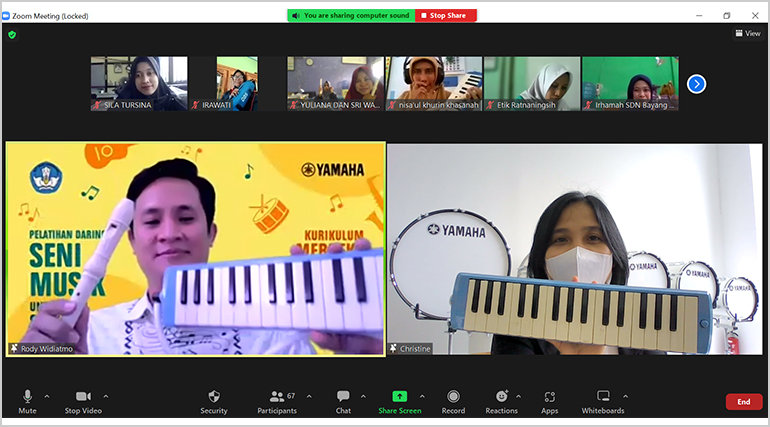
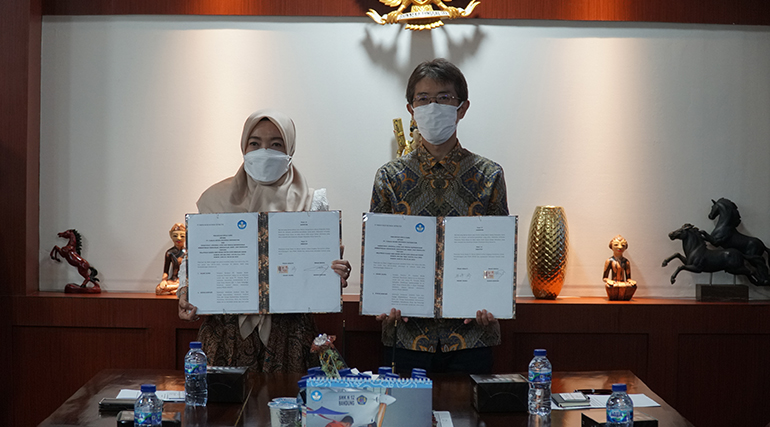

India
With both sales offices and production sites in the country, Yamaha’s business in India combines production and sales as it strives to make local production and local consumption a reality.
School Project launched in India in 2017 and programs using recorders and keyboards can now be found nationwide. In order to achieve adequate coverage in such a massive country, core instructors are assigned by area to support local teachers as the program expands within their areas. The program uses keyboards made in India at the Chennai factory.
In 2022, Yamaha’s efforts at government primary schools in Delhi were adopted as a 2022 EDU-Port Japan Supported Project by MEXT under the designation of “Introduction of Japanese-style Music Education in Primary Education in India.”


UAE
What began as recorder promotion activities in 2018 in UAE turned into full-blown recorder training for teachers at over 90 schools in 2022, in collaboration with the Emirates School Establishment.
Follow-up with teachers continues with the ultimate aim of introduction at all UAE schools, with the primary focus on extra-curriculum activities.
Egypt
In Egypt, in accordance with national education policy, the country is currently promoting education under a new curriculum that aims to develop Non-Cognitive Skills such as socialization, cooperation, and discipline.
Aiming to support the implementation of this new curriculum, Yamaha began working together with Egypt’s Ministry of Education and Technical Education in 2020. Efforts began with the introduction of Japanese-style musical instrument education at Egyptian Japanese Schools, in the form of interactive classes using recorders. Classes include both teacher-student and student-student interaction. In 2021, trial lessons began at 10 schools, with plans to expand to every school in the country, aiming to develop both musical and Non-Cognitive Skills.
This initiative was selected as a Japan International Cooperation Agency (JICA) SME/SDG Business Support Project in 2020, and also as a 2020/2022 EDU-Port Japan Supported Project by MEXT.



Brazil
In Brazil, music classes were made compulsory at schools in 2015. In 2017, the curriculum for early childhood and primary school education was renewed, shifting the focus to ten competencies outlined in the Base Nacional Comum Curricular (BNCC), which emphasizes both cognitive and Social and Emotional Skills.
Yamaha Musical do Brasil Ltda. launched the SoproNovo Project in Brazil in 2005 and has long worked to expand and sustain musical promotion activities in Brazil. Now, as the country’s educational environment undergoes drastic changes, we are working to reinforce our efforts to support its development.
Most recently, we have been conducting investigation and analysis to determine the feasibility of introducing classes using recorders and transmitting teaching methods at public elementary schools in Rio de Janeiro, and what Social and Emotional Skills students might develop via those classes. In 2022, these activities were adopted as a 2022 EDU-Port Japan Supported Project by MEXT under the designation of “Introduction of Japanese-style Instrumental Music Education in Primary Education in Brazil.”



